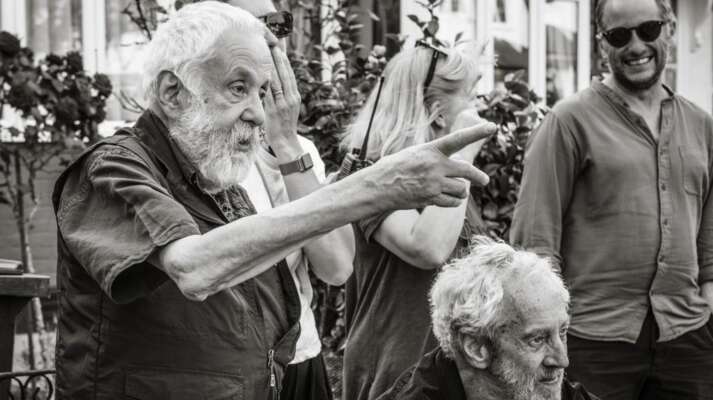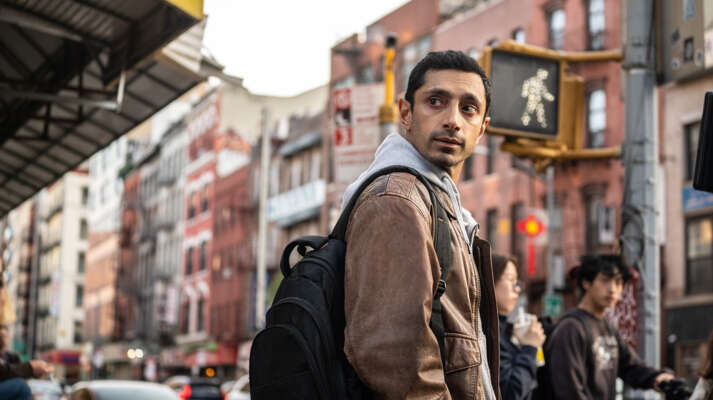Actors We Love: Rachel Weisz
Five of Rachel Weisz’s most compelling cinematic performances, from The Constant Gardener to DENIAL.
Actors We Love: Rachel Weisz
Written by Peter Bowen
DENIAL | Finding the Truth of a Character
In Mick Jackson’s DENIAL, Rachel Weisz plays Deborah E. Lipstadt, the historian whose book, Denial: Holocaust History on Trial, is dramatized in the film. In 1996, Holocaust denier David Irving (Timothy Spall) accuses Lipstadt of libel in the English courts, a forum that so strongly favors the plaintiff that many publishers simply withdraw their books. Refusing to back down, Lipstadt and her legal team, solicitor Anthony Julius (Andrew Scott) and barrister Richard Rampton (Tom Wilkinson), mount a case that asserts the primacy of historic truth and the tragic reality of the Holocaust. In taking on the role, Weisz reached out to learn as much as she could about Lipstadt. “She’s quite brilliant and very instructive,” acknowledges Weisz. “I didn’t know anything about Holocaust denial. But I was interested in knowing how she can teach such an emotional subject. How does she remain unemotional while teaching about something that’s difficult to stomach?” For Jackson, the film’s director, some of Weisz’s success in channeling Lipstadt’s unique persona lay in the traits the two share. “She’s spirited like Deborah, as well as sharp, impulsive and empathetic,” notes Jackson. Over the years, Weisz has used these qualities to bring to life a range of fascinating characters. Here, we spotlight some of the remarkable performances that have made Rachel Weisz an actress we love.
Sunshine | Radiating Passion

In 1999, the same year that Rachel Weisz became an international movie star in the summer blockbuster The Mummy, she shone as a serious dramatic actress in István Szabó’s saga Sunshine. Written by Israel Horovitz and Szabó, Sunshine follows three generations of a Hungarian-Jewish family, from its rise in becoming a prominent player in Budapest’s social scene to its brutalization by the Nazis, to its slow disintegration under a repressive communist regime. To create a narrative continuity, Szabó cast a single actor, Ralph Fiennes, to play the significant male family member in each generation. In the first section, Fiennes plays Ignatz, a man already wealthy from his parents’ herbal beverage, “Taste of Sunshine,” who now seeks to gain respectability by becoming a judge. In the second section, Fiennes plays Adam, Ignatz’s son, a golden boy who will cover up everything to maintain a veneer of respectability. He converts to Catholicism to ensure his place on the Hungarian fencing team, for which he wins a gold medal at the 1936 Olympics in Berlin. And he hides his heart after he enters into a passionate affair with his sister-in-law, Greta (Rachel Weisz). In the end, none of his trappings of respectability save him, his family, or his beloved Greta from the violent tide of Nazi oppression. For Weisz, aspects of this family’s history were not all that different from her own. “My dad left Hungary two years before war broke out because they were passing new anti-Semitic laws,” she relates to The Telegraph. Although Greta was a supporting role, Weisz’s energy and passion caught the attention of more than a few critics. “Rachel Weisz is extraordinary in just a handful of scenes as Greta, a woman in love with Adam, her brother-in-law. At first she seems half-mad, but ultimately there's something moving in her desperate lunges for happiness,” applauds The San Francisco Chronicle’s Mick LaSalle. As a Canadian co-production, Sunshine was nominated for 14 Genies (the Canadian version of the Academy Awards), including Best Supporting Actress for Weisz.
The Constant Gardener | Exploring the Mystery

In Fernando Meirelles’s 2005 adaptation of John le Carré’s The Constant Gardener, Rachel Weisz plays Tessa, the politically active wife of career diplomat Justin Quayle (Ralph Fiennes). Tessa’s death at the film’s start sets off a series of flashbacks in which Justin tries to comprehend both how his wife died and what her life meant to him. In remembering his poignant and unexpected love affair, Justin finds himself also retracing his wife’s steps, a path that leads him to uncover a conspiracy of international pharmaceutical concerns in Africa. Like the best of le Carré’s work, this thriller brings together the real-world machinations of global politics with the heartfelt reality of the characters’ emotional lives. To comprehend the labyrinthine world of NCOs, international drug testing, and African politics, Weisz traveled to Kenya to talk with aid workers and political activists. While such research gave a certain realness to her performance, Weisz never lost sight of the unique moral complexity that le Carré gave her character in the novel. “I loved the fact that she wasn't entirely sympathetic, that she was a lone warrior with all the contradictions that that brings,” Weisz tells The Guardian. Le Carré, who loved the film, commended her tough task as well: “She had a difficult role, a girl who has the wealth to afford her principles.” Critics, who applauded the power of her performance, also commended the skill with which she maintains the integrity of le Carré’s vision, stepping “straight from the pages of the book onto the screen, as she fully embodies the driven, lusty, unstoppable Tessa,” in the words of Variety’s Todd McCarthy. Her performance was richly awarded the next year when she won both a Golden Globe and an Academy Award for Best Supporting Actress.
The Whistleblower | Giving History a Voice

In 2005, The Constant Gardener producer Amy Kaufmann sent Rachel Weisz the script of The Whistleblower. Written by Ellis Kirwan, the film was inspired by the real-life tale of Kathryn Bolkovac, a Nebraskan police officer who in 1999 became part of an UN peacekeeping mission in post-war Bosnia. After being fired for blowing the whistle on a sex-trafficking ring operating among peacekeeping forces, Bolkovac sued DynCorp, the company contracted by the UN to maintain security, for wrongful termination and won, bringing much needed attention to these international abuses. Although Weisz was unable to do the film in 2005, the story and the character stayed with her. “It's a thriller, but to me it's a character study, because it's her character that led her to do what she did,” Weisz tells The Chicago Tribune. When the movie went into production in 2009, Weisz was on board, spending as much time as she could with Bolkovac to understand the woman and what drove her. For most critics, Weisz’s hard work in crafting this principled and emotional character paid off. “The movie, constructed as a relentless and frightening thriller, stars Rachel Weisz in one of her best performances, portraying Bolkovac as a quiet, intense woman who has heroism thrust upon her by the evidence of her own eyes,” notes Roger Ebert. Weisz’s performance also deeply affected those personally connected to the world of Bolkovac’s story. At a special United Nations screening, UN Secretary-General Ban Ki-moon proclaimed, “This film reminds us how important one person’s voice can be. It underscores how important it is to speak out against abuse or injustice.”

The Deep Blue Sea | A Profound Love
If Rachel Weisz has built a remarkable resume playing strong, smart woman, she proves just as capable in capturing one drowning in the murky depths of emotion, as she did in Terence Davies’ 2011 film The Deep Blue Sea. Adapted from Terence Rattigan’s 1952 play of the same name, the story captures the impossible predicament of Hester Collyer (Weisz). Hoping to escape the deadness of her loveless marriage to High Court judge Sir William Collyer (Simon Russell Beale), Hester takes up with Royal Air Force pilot Freddie Page (Tom Hiddleston), only to find his unpredictable passion creates a different kind of prison for her. Weisz admits that she had not read much of Rattigan prior to Davies sending her his screenplay, but once she read it, she found it "a really fascinating exploration of a woman falling in love, who's completely out of control,” as she told the Los Angeles Times, “She loses all her dignity, all her pride, kind of makes a fool of herself." The plot, which mostly unfolds in a series of flashbacks, attempts to stitch together the moments that brought Hester to a point of no return, a place where ending one’s life appears preferable than enduring it. In a turn that is neither maudlin, nor melodramatic, Weisz embodies a woman driven by profound emotions. For The Los Angeles Times’ Kenneth Turan, Weisz’s performance was “every bit as compelling as her Oscar-winning work in The Constant Gardener.” For her impassioned portrayal, Weisz was nominated for a Golden Globe award for Best Actress.
The Lobster | A Force of Nature

Earlier this year, Rachel Weisz appeared in Yorgos Lanthimos’ absurdist romance, The Lobster. In this satirical fable, David (Colin Farrell), whose wife has recently left him for another man, is sent to a hotel where he must find a suitable mate in 45 days or be turned into animal of his choice. After several misguided attempts at romance, David flees to the forest where he takes up with a band of outlaw loners, including the Short Sighted Women (Weisz) who might just be what his heart desires. For the actors, the film’s ambiguous, allegorical tone provided few cultural and cinematic clues to guide their performances. "It is a world that we've created so there are very different rules and we don't really know the answers to all of these rules and how things work," Lanthimos tells Esquire magazine. "In general I'm not a huge believer of too much analyzing the material or characters. I find that performances become too self-conscious, too obvious." For Weisz, finding the emotional truth of a character with so little background was an inspiring challenge. “There was no way for preparing for this role. I just wanted to be part of his universe,” Weisz tells The Independent. The world of The Lobster, however, demands the most of inhabitants. “These people in the film are expressive of that kind of search for happiness which can be excruciatingly soul-wrenching and trying on your spirit,” Weisz relates to London Calling. Weisz’s unique take on this brave new world impressed Lanthimos, who tells Indiewire, “I was surprised that I had never seen her like that before, because it is natural for her.” Lanthimos was not alone in his admiration. Many critics were equally impressed with how Weisz brought such humanity to an abstract fable. The New York Times’ A.O. Scott writes, “Rachel Weisz…is perfectly cast as the only person in this world with the normal capacities for warmth, empathy and desire. She allows a credible love story to peek out through the elaborate trappings of allegory and satire.”


